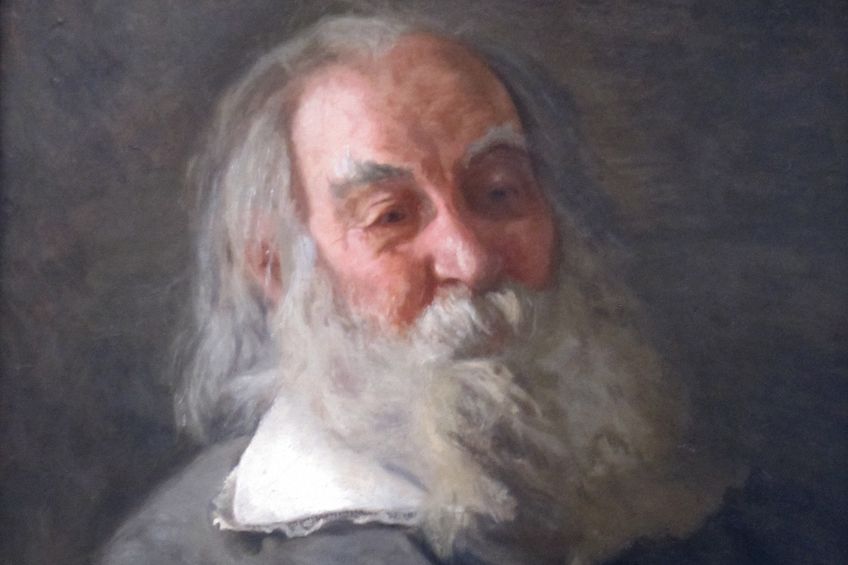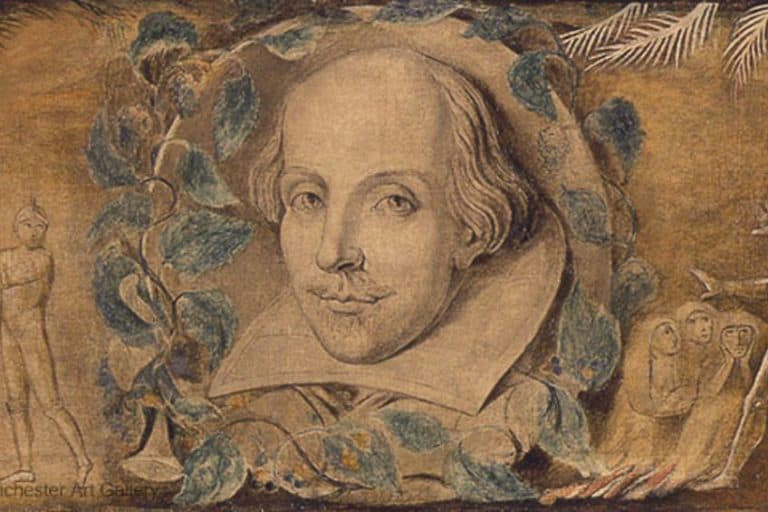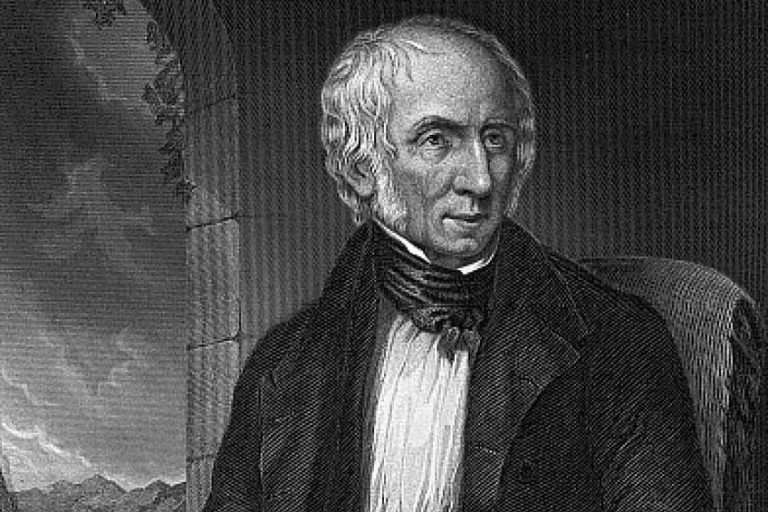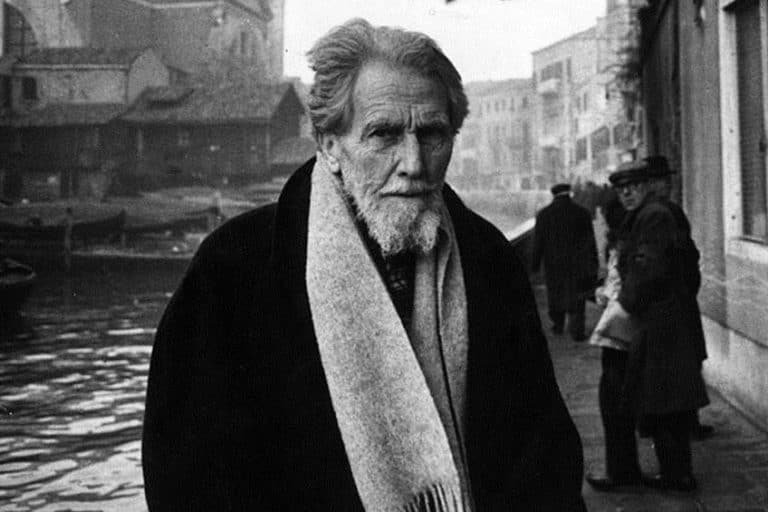Walt Whitman Poems – Explore the Best This Poet Has to Offer
Walt Whitman is one of those poets who is far better known now that he has passed away than he was in life. His work has led him to become known as the Father of Free Verse Poetry for a reason. We are going to have a look at a number of the most famous Walt Whitman poems over the course of this article, and we are going to discuss the content of these poems along with some of the more formal aspects. The work of Walt Whitman has influenced many, and so it’s worth examining the poems that led to this influence.
Famous Walt Whitman Poems
Walt Whitman was a poet, essayist, and writer who is best remembered for his poetry. One of the reasons that he is so remembered for his poetry is because he has become known under the moniker of the Father of Free Verse Poetry. His work was noted for its incorporation of realism and transcendentalism, its novel approach and presentation, and for its more cavalier attitude towards topics that were considered controversial at the time, but have since become far less controversial, such as overt sexual themes.
His work may have become immensely influential after his death, but during his life, he also engaged in a number of professions. For instance, he was active during the American Civil War as a carer in Union hospitals. This is also reflected in much of his poetry. In addition, when Abraham Lincoln, of whom Walt Whitman was an admirer, was assassinated, Whitman produced some of the most famous poems about the deceased president.

Whitman would eventually pass away in 1892, and by the time he died, he was more acclaimed than when he had started his career, but his real fame would come after his death. His work in free verse poetry, his experimental style that could not easily be pinned down, and his celebration of themes like love, democracy, nature, and friendship have made him an important figure in the development of 19th-century literature. Furthermore, his influence on 20th century Modernism, and everything that it influenced is immeasurable.
Now that we are done with our brief discussion of the man behind the poetry, we should have a look at some of that poetry! We are going to examine ten of the best-known Walt Whitman poems today, and these poems include poems about traveling, a few Walt Whitman love poems, and a number that are associated with the death of Abraham Lincoln.
Let’s have a look at some of these famous Walt Whitman poems.
There was a child went forth every day (1855)
| Date Published | 1855 |
| Type of Poem | Free verse |
| Rhyme Scheme | None |
| Meter | None |
| Topic | Children |
There was a child went forth every day is one of the poems by Walt Whitman that was concerned with the idea of children and the way in which they perceive themselves and their surroundings. We all start to form our identities early in our lives, and when we start with our identity formation, we do so to figure out who we are in the world. What are our interests? What are our dislikes? Who are we as people? In this case, the poem examines this through a relationship between this child and the natural world around him.
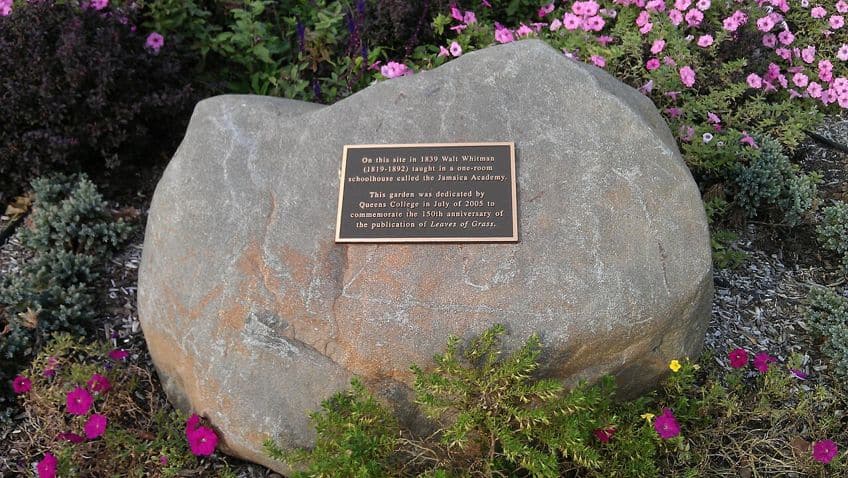
The poem makes use of various natural images, such as lilacs, grass, morning glories, birds, lambs, calves, and a variety of other natural images. This comparison to both plants and non-human animals allows the child to learn who they are over the course of each day as they venture out into the world to have experiences and interactions with the world at large. It is only through our everyday experiences that we can start to determine who we are in life.
The poem is centrally concerned with the concept of becoming.
This is the way in which we originate as one thing but then eternally become something else. There is never truly an endpoint until our deaths as we are constantly growing, changing, and adapting to our environment as we take one day after another to learn all that we can about both ourselves and the world at large.
Song of the Open Road (1856)
| Date Published | 1856 |
| Type of Poem | Free verse |
| Rhyme Scheme | None |
| Meter | None |
| Topic | Traveling |
Song of the Open Road is a poem of celebration. We are often accustomed to seeing poems that are either concerned with love or something very morbid, but poems can also allow us to convey our feelings of pleasure about something that may ordinarily seem to be somewhat mundane. In terms of Walt Whitman poems, this one is all about traveling. The title of the poem does somewhat give this away though. It is a song dedicated to the open road.

The open road is something that can stand before all of us, and it allows us the freedom to go where we wish to go. There is also a long history of American art and literature that focuses on the vast expanses available to American citizens in their country as large swaths of the country are simply open roads that one can explore at one’s leisure. However, this open road is not simply a literal one, but a metaphorical one too. The open road may be a very real thing that can be traveled, but it is also a symbol of freedom. To travel is to let go of ordinary attachments, such as the prospect of a stable home or the domestic constraints of ordinary life.
The poem invites us to let much of that go as we instead embrace the outside world, the world that opens up before us if we simply allow ourselves to travel along it.
Crossing Brooklyn Ferry (1856)
| Date Published | 1856 |
| Type of Poem | Free verse |
| Rhyme Scheme | None |
| Meter | None |
| Topic | Shared human experiences |
Crossing Brooklyn Ferry is a poem that is concerned with the country of the United States in a way that many of Walt Whitman poems were concerned, and, in this case, it uses the idea of a simple ferry to explore something much deeper. The basic reading of the poem is also self-evident in the name of the poem. It is about crossing the East River in New York via the Brooklyn Ferry.
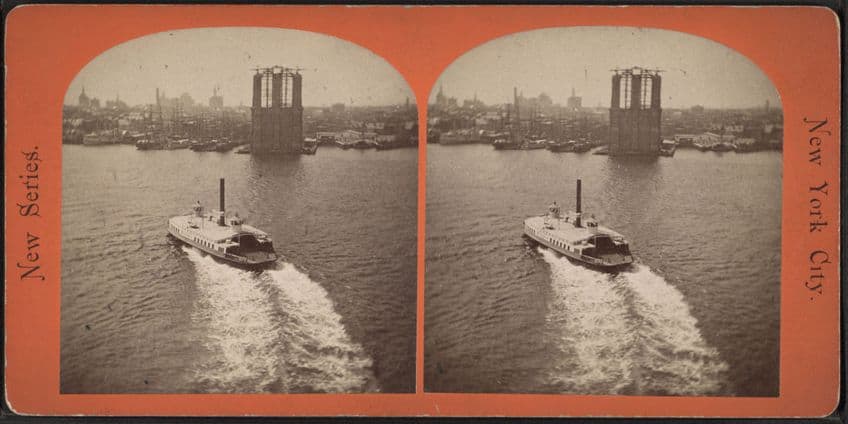
This, like many of the poems by Walt Whitman, makes use of a rather simple and understandable element, such as crossing a ferry, to instead focus on something more universalizable. While we have not all crossed this ferry, the feelings that Whitman describes as he crosses said ferry are those that can be far more easily understandable to many others in our world. The poem examines the idea of our shared human experiences. Whitman made use of this ferry to cross over a river, and there were many others around him and there will be many more after he has left. What did they think as they crossed that ferry? What did they think as they saw the same things that he saw? Did they think as he did or did they think something entirely different?
We may all experience the same things, but we experience them in different ways, and poems like this are a phenomenal example of the kind of power that Walt Whitman poems are able to attain.
When I Heard the Learn’d Astronomer (1865)
| Date Published | 1865 |
| Type of Poem | Free verse |
| Rhyme Scheme | None |
| Meter | None |
| Topic | Imagination and science |
When I Heard the Learn’d Astronomer is likely one of the most famous poems by Walt Whitman. In the case of this famous Whitman poem, the concern is with an understanding of science versus the human imagination. The poem is skeptical of the way that science has examined the world and instead wishes to see it in a very different way, in a more mysterious way.

This is not an idea that is exclusive to Walt Whitman, and many have written on how science effectively seeks to dismantle all the mysteries of the universe. Science is not there to stand in reverence before the strange things in our world. Instead, science is there to understand those things and to explain them to others. Science does not want to leave any stone unturned, and those with more spiritual beliefs can often see this as a negative thing because it means that the world as it is in our minds is not necessarily the real world. The poem itself explores this through the speaker’s attendance at a lecture. This lecture is given by the “learn’d astronomer” from the title of the poem. This person gives out all sorts of facts, figures, statistics, diagrams, and charts to those who are in attendance, and the speaker eventually gets up and instead walks outside to gaze up at the heavens.
The spiritual feeling is evident in the way that the universe is perceived by the speaker as opposed to the highly educated explanations of the astronomer.
O Captain! My Captain! (1865)
| Date Published | 1865 |
| Type of Poem | Elegy |
| Rhyme Scheme | Variable |
| Meter | Iambic pentameter |
| Topic | Tribute to Abraham Lincoln |
O Captain! My Captain! is one of the most famous Walt Whitman poems and definitely the most famous of the various poems that he wrote in dedication to Abraham Lincoln. The assassination of Abraham Lincoln came as a severe blow to Walt Whitman, who was a great admirer of the president. For instance, Walt Whitman served on the Union side of the American Civil War and worked in hospitals during that period. When the man who was seen as the end of slavery came to his own end, there was significant national mourning because of that, and Walt Whitman expressed his mourning through a poem.
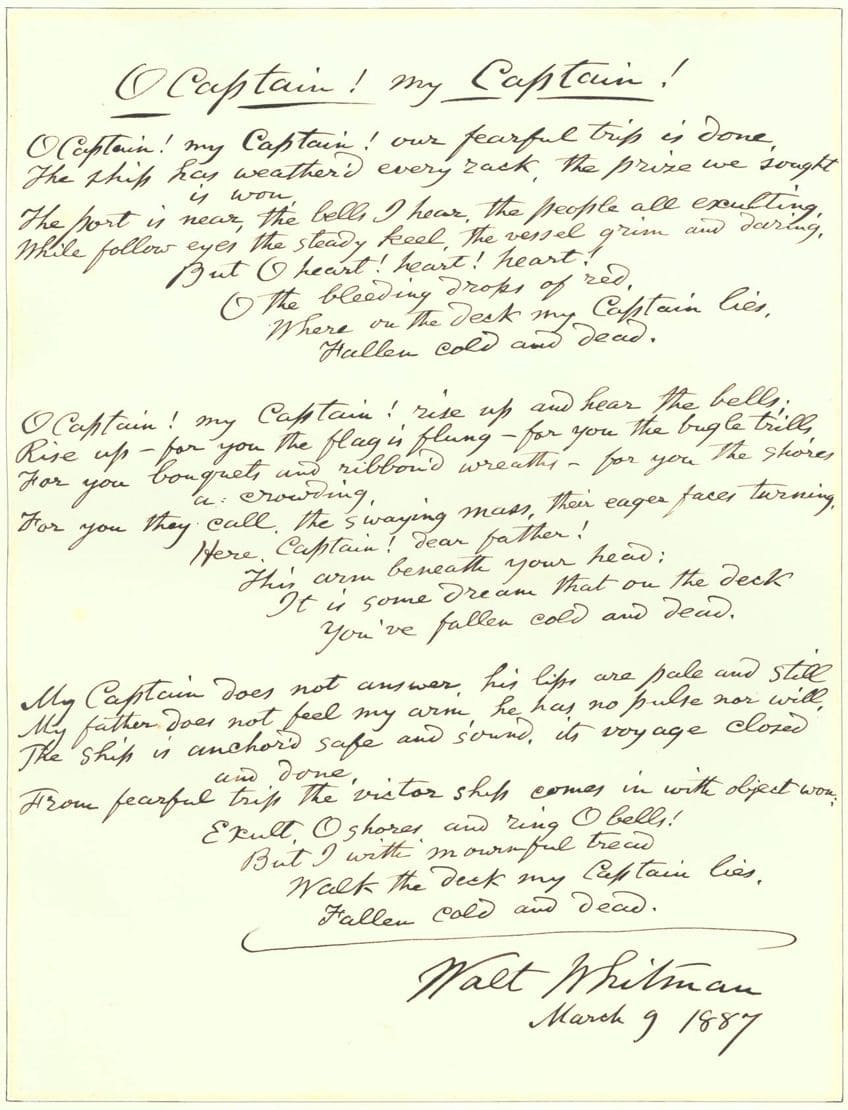
This poem aimed at Abraham Lincoln makes use of the metaphor of a ship’s captain. The ship is the United States, and the captain is Abraham Lincoln. The ship has been barreling its way through harsh and difficult seas, and it is easy to see that as a parallel with the American Civil War. The captain perishes in the end after managing to get them back to shore. The poem is a rather easy extended metaphor to understand as Abraham Lincoln is still highly respected to this day because of his involvement in the American Civil War and its ultimate end (alongside the end of slavery in the country), and, only shortly after the conclusion of that war, he was shot and killed.
The poem explores the feelings that Walt Whitman had about the president.
Hush’d Be the Camps To-Day (1865)
| Date Published | 1865 |
| Type of Poem | Free verse |
| Rhyme Scheme | None |
| Meter | None |
| Topic | Tribute to Abraham Lincoln |
Hush’d Be the Camps To-Day is another of the poems that serves as a tribute to Abraham Lincoln. However, this poem is not quite as famous as O Captain! My Captain! Regardless of that, this poem has come to be considered an immensely important tribute to the life and death of the President of the United States. The poem serves as a way of expressing the grief that he experiences thanks to the loss of the president while also admiring said president and the impact that said president had on the country.
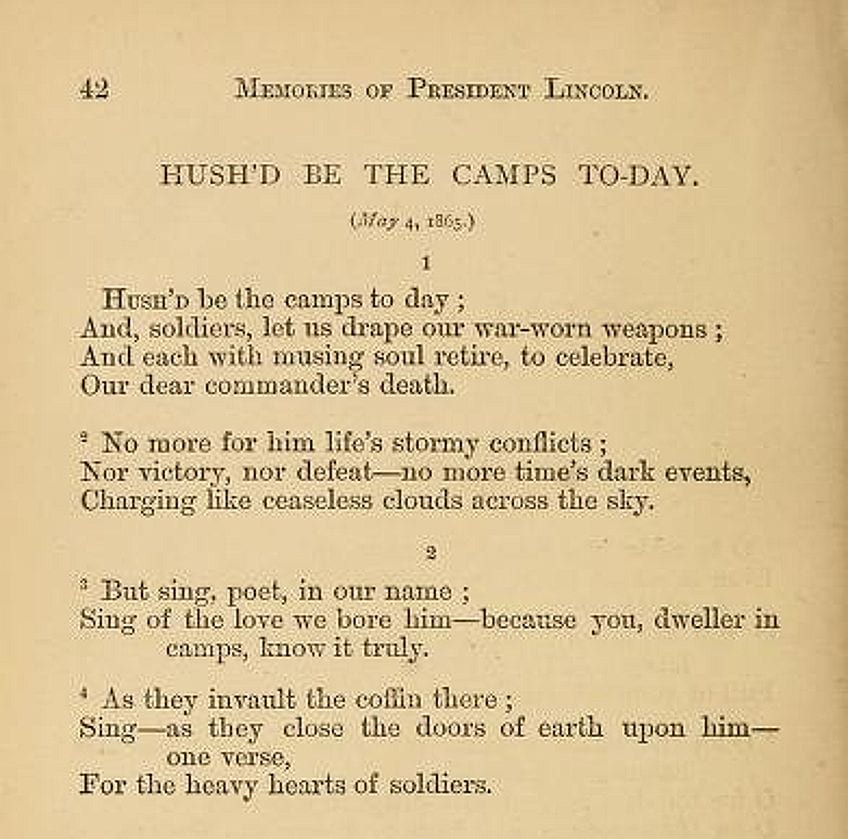
The general idea behind this poem is that it calls upon the various camps in the country to become quiet in respect to the man who has died. This is a common means of honoring the dead as the idea of a moment of silence has become deeply ingrained in our collective culture. We see silent contemplation on the thoughts of those who have perished as a means of respecting and commemorating those we remain silent for. The idea of “camps” is one directly concerned with the American Civil War which had only just come to an end, and the death of Lincoln is seen as the final point of that end.
Walt Whitman’s poem is concerned with the soldiers who fought in that war, the soldiers who can now retire their weapons and commemorate the death of their commander in the war that is, at last, over.
Pioneers! O Pioneers! (1865)
| Date Published | 1865 |
| Type of Poem | Paean |
| Rhyme Scheme | Variable |
| Meter | Variable |
| Topic | Praise for Westward Expansion |
Pioneers! O Pioneers! is a poem by Walt Whitman that may not hold up as much as it once did with its celebratory nature. The reason for this is that the poem is concerned with the American nation’s westward expansion that led to the exploration of states like California and the Gold Rush that would become prominent in the region. This period of time was integral to the development of the United States as it stands today, but a highly celebratory mood like this may not suit many modern sensibilities.

While westward expansion in the United States may have been important for the development of the country, it also often involved conflict with Native American peoples and led to a variety of treaties that were generally quickly broken to make way for further expansion. The highly celebratory nature of this particular poem is indicative of the time period though, and many white Americans highly celebrated the “pioneers” who journeyed across the region. The poem does also touch on ideas concerning Manifest Destiny, which was the idea that white Americans of European descent had been ordained by a higher, divine power, to settle the entirety of North America.
This idea has received significant pushback in recent years but was a common belief at the time.
A Noiseless Patient Spider (1868)
| Date Published | 1868 |
| Type of Poem | Free verse |
| Rhyme Scheme | None |
| Meter | None |
| Topic | Isolation and patience |
A Noiseless Patient Spider is a poem by Walt Whitman focused on exactly what the title says that it is focused on: a spider. The spider is used as a metaphor for something larger and more human, but the poem opens with an examination of the spider on its own. The spider spins its web and continues to toil away in its environment, but this changes as it shifts into the second portion of the poem.
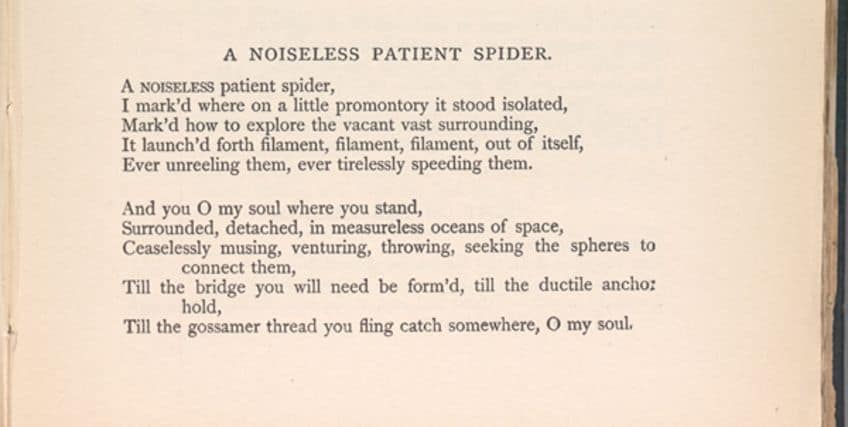
The second stanza transitions to an examination of the speaker and the spider, and their connection to one another. The speaker, who is a human, considers themselves to be similar to the spider that spins its webs as the speaker is also constantly looking for connection in much the same way. The speaker is throwing out their own webs to catch something. This poem’s metaphor is a poignant one that serves as a strong means of understanding the ways in which humans may seek out connections while also making a direct comparison to the non-human animals that we share our world with.
The metaphors that Walt Whitman poems often explore can be powerful to many.
This Dust Was Once the Man (1871)
| Date Published | 1871 |
| Type of Poem | Elegy |
| Rhyme Scheme | None |
| Meter | Trochaic octameter |
| Topic | Elegy to Abraham Lincoln |
This Dust Was Once the Man is the last of the many poems that Walt Whitman wrote about Abraham Lincoln, although this one was written significantly later than the others in this series of poems about Abraham Lincoln. The poem is concerned with what Lincoln seemingly did in his life for the United States of America, and the poem makes specific reference to Lincoln as being the one who saved the country from the worst crime in its history.
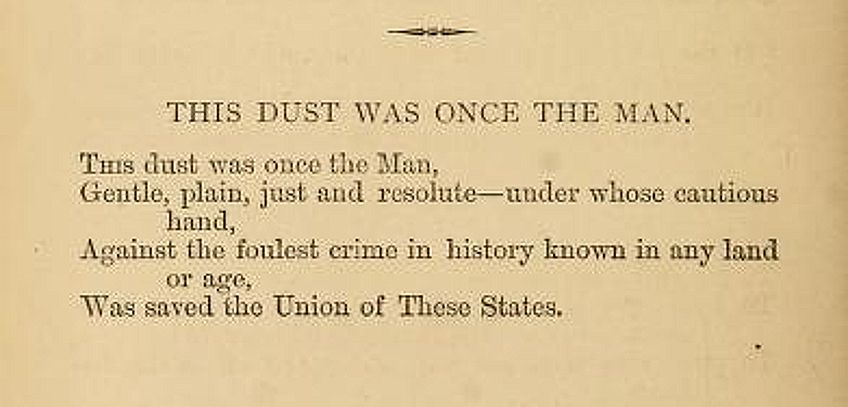
There are a few contenders for that terrible crime, and it could have been the secession of the Confederate States from the rest of the Union, or it could have been the very obvious crime of slavery that was rampant in the country before the American Civil War. However, this elegy is a short one and it does not go into all that much detail. One of the fascinating aspects of this poem is its shortness. Many Walt Whitman poems tend to be rather lengthy things that explore topics in some depth, but the brevity of this particular poem is what makes it such a poignant one. It also no longer refers to Lincoln with the kind of elevated tone he used in his other poems about the man, and instead referred to him as dust.
It had been years since the assassination of the president, and so he had likely become closer to dust than he had been earlier in his death.
Song of Myself (1892)
| Date Published | 1892 |
| Type of Poem | Free verse |
| Rhyme Scheme | None |
| Meter | None |
| Topic | The self |
Song of Myself is one of the later poems by Walt Whitman and is concerned with the self. This is the concept of who we are as people. We are all selves and together we serve as others to other selves, and this poem explores that idea by discussing the ways in which we can move towards a more spiritual form of the self as we move our way through our lives.

The concept of the self is a long-running one in many different forms of philosophy around the world. The self leads to our identities and the way that we perceive ourselves in this world. Is the self something truly universal that forms part of the life cycle of the planet or is it more individualized? What is definite is that it is something that is constantly changing, as has been explored in some of the poems above. In Walt Whitman’s poem, the answer lies in a more spiritual direction.
The poem is a rather interesting blend of biographical elements of the poet in question and a sermon of sorts. It makes use of a number of different scenes to show the different elements of the self that Walt Whitman wishes to explore and reveal to us. The poem is also considered to have very strong Transcendentalist influences in it.
There are not all that many poets who can achieve the kind of influence that Walt Whitman was able to achieve, and he is also noted as one of the poets who attained much of that fame after his death. This is why we have examined and discussed ten of his most famous poems in this article today. We have looked at a number of different poems by Walt Whitman, but there are a great many other poems by the Father of Free Verse Poetry that are also worth reading and analyzing if you get the chance. He left behind quite an array of work, and much of it is worth a perusal.
Frequently Asked Questions
Who Was Walt Whitman?
Walt Whitman was an American writer who is best known for his poetry. His work has become immensely influential and has often come to be seen as some of the most important of the 19th century. One of the reasons for his immense fame is thanks to the notion that he has been given the moniker of the Father of Free Verse Poetry. While he did also write in styles other than free verse, and some of his most famous poems are not in free verse at all, Walt Whitman poems have generally been placed under this label. His work was also, at the time of its publication, considered to be controversial because of some of the sensual elements that were perceived to be obscene.
What Kind of Poetry Did Walt Whitman Write?
Seeing as Walt Whitman has come to be called the Father of Free Verse Poetry, it’s safe to say that he wrote a lot of free verse poetry. However, Walt Whitman poems come in many different shapes and sizes, and he did write a number of more traditional poems. Regardless of this, his work is typically noted for the fresh style that he implemented, and his more cavalier attitude towards a number of different topics that were considered to be more controversial at the time of their publication. Some of these elements lead to him receiving less critical acclaim during his life.
What Are the Most Famous Poems by Walt Whitman?
When it comes to the many poems by Walt Whitman, there are numerous famous examples. He wrote a large collection of poetry during his life, and for that reason, among others, he has many famous poems, but some of the most notable include When I Heard the Learn’d Astronomer (1865), O Captain! My Captain! (1865), and Song of Myself (1892). There are many other famous poems by Walt Whitman out there that are worth reading and analyzing.
What Are the Most Famous Walt Whitman Love Poems?
Walt Whitman is not necessarily known for his love poems, but there have been a number of fantastic Walt Whitman love poems. Some of them include poems like I Dream’d in a Dream (1860), Sometimes with One I Love (1867), and To You (1897). However, it does also depend on how one defines a term like love because Whitman’s multiple poems about Abraham Lincoln could be termed a kind of love poem, such as O Captain! My Captain! (1865). However, it would be debatable whether this could be classified as an example of one of the few Walt Whitman love poems in the traditional sense of the word.
Which Poets Did Walt Whitman Inspire?
Walt Whitman poems have been immensely influential. Seeing as free verse poetry, for which Whitman was well known, would go on to become one of the most used styles of the 20th and 21st centuries, his influence can be seen in many poets. There are even poets who were inspired by the many poets who were, in turn, inspired by Whitman, and so his indirect influence is likely even greater than his direct influence. Some of those include Ezra Pound, William Carlos Williams, Allen Ginsberg, Pablo Neruda, and Langston Hughes. There are, as has been stated, many more that were inspired by the many Walt Whitman poems in the world.
Justin van Huyssteen is a freelance writer, novelist, and academic originally from Cape Town, South Africa. At present, he has a bachelor’s degree in English and literary theory and an honor’s degree in literary theory. He is currently working towards his master’s degree in literary theory with a focus on animal studies, critical theory, and semiotics within literature. As a novelist and freelancer, he often writes under the pen name L.C. Lupus.
Justin’s preferred literary movements include modern and postmodern literature with literary fiction and genre fiction like sci-fi, post-apocalyptic, and horror being of particular interest. His academia extends to his interest in prose and narratology. He enjoys analyzing a variety of mediums through a literary lens, such as graphic novels, film, and video games.
Justin is working for artincontext.org as an author and content writer since 2022. He is responsible for all blog posts about architecture, literature and poetry.
Learn more about Justin van Huyssteen and the Art in Context Team.
Cite this Article
Justin, van Huyssteen, “Walt Whitman Poems – Explore the Best This Poet Has to Offer.” Art in Context. November 8, 2023. URL: https://artincontext.org/walt-whitman-poems/
van Huyssteen, J. (2023, 8 November). Walt Whitman Poems – Explore the Best This Poet Has to Offer. Art in Context. https://artincontext.org/walt-whitman-poems/
van Huyssteen, Justin. “Walt Whitman Poems – Explore the Best This Poet Has to Offer.” Art in Context, November 8, 2023. https://artincontext.org/walt-whitman-poems/.


